-
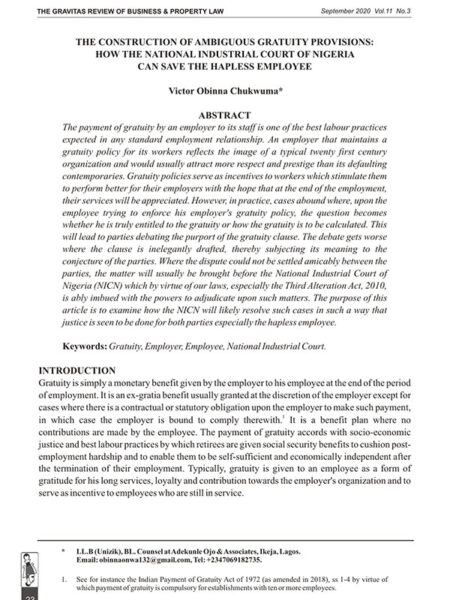
The Construction of Ambiguous Gratuity Provisions: How the National Industrial Court of Nigeria Can Save the Hapless Employee
0₦2,500.00Victor Chukwuma of Adekunle Ojo & Associates Lagos Nigeria, in his article, The Construction of Ambiguous Gratuity Provisions: How the National Industrial Court of Nigeria Can Save the Hapless Employee, examines the concept of Gratuity under Nigerian law. Chukwuma considers cases where the gratuity clause in the employment contract was in dispute and suggest mechanisms that may guide the National Industrial Court in resolving ambiguous gratuity clauses in employment contracts.
-
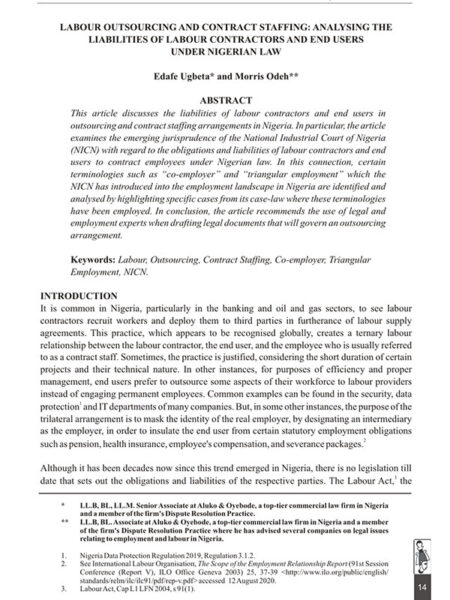
Labour Outsourcing and Contract Staffing: Analysing the Liabilities of Labour Contractors and End Users under Nigerian Law
0₦2,500.00Edafe Ugbeta and Morris Udeh of Aluko & Oyebode in their article, Labour Outsourcing and Contract Staffing: Analysing the Liabilities of Labour Contractors and End Users under Nigerian Law, >observe that generally, parties are bound by their contract, and the law does not permit the courts to alter or rewrite the terms and conditions freely agreed by the parties. However, recent decisions of the National Industrial Court of Nigeria suggest that the court may now hold end-users of labour and parent companies liable to adhere to statutory employment obligations relating to pensions, insurance, tax, health and compensation where the court considers that the labour contractor or subsidiary is a mere sham, agent, tool, or employee of the end-user/parent company for purposes of masking the identity of the real employer.
-
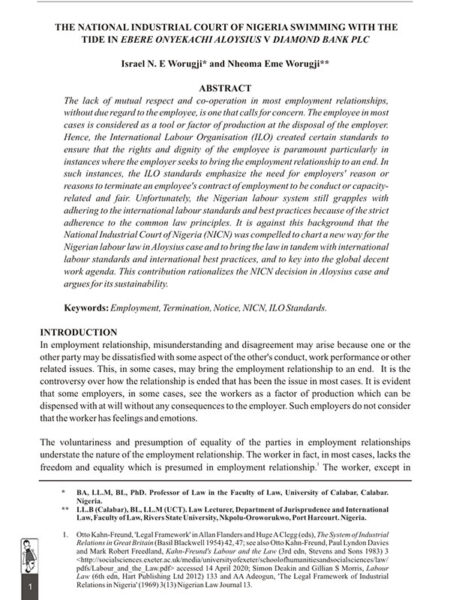
The National Industrial Court of Nigeria Swimming with the Tide in Ebere Onyekachi Aloysius V Diamond Bank Plc
0₦2,500.00Professor Israeli Worugji of the University of Calabar, Nigeria and Nheoma Worugji of the Rivers State University, Nkpolu-Oroworukwo Port Harcourt Nigeria, in their article, The National Industrial Court of Nigeria Swimming with the Tide in Ebere Onyekachi Aloysius V. Diamond Bank, note that ordinarily, an employer has the freedom to terminate the employment of an employee upon due notice and regardless of motive. The National Industrial Court of Nigeria (NICN) in a recent decision, however, seems to have limited the employer’s otherwise open-ended power to bring the contract of employment to an end. In Aloysius case, the NICN, relying on international labour standards and its new mandate under the Constitution (Third Alteration) Act, decided that no termination of a contract of employment should take place unless there is a valid reason connected with the capacity or conduct of the employee or based on the operational requirements of the establishment.Professor Israel Worugji and Nheoma Worugji review the Aloysius the case against the background of the common law and statutory provision on termination of employment, the International Labour Organisation’s instruments and international best practices.
-
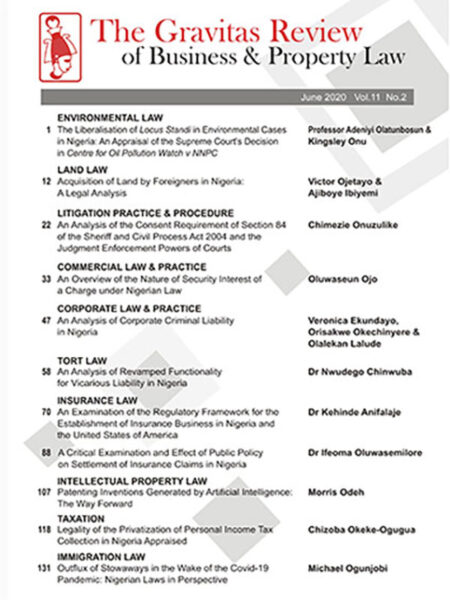
The Gravitas Review of Business & Property Law Vol.11 No.2 – Print
0₦5,000.00In this issue of The Gravitas Review of Business & Property Law Vol.11 No.2, there are well researched articles on:
- Environmental Law
- Land Law
- Litigation Practice & Procedure
- Commercial Law & Practice
- Corporate Law & Practice
- Tort Law
- Insurance Law
- Intellectual Property Law
- Taxation
- Immigration Law
-

The Gravitas Review of Business & Property Law Vol.11 No.2 – E-Book
0₦5,000.00In this issue of The Gravitas Review of Business & Property Law Vol.11 No.2, there are well researched articles on:
- Environmental Law
- Land Law
- Litigation Practice & Procedure
- Commercial Law & Practice
- Corporate Law & Practice
- Tort Law
- Insurance Law
- Intellectual Property Law
- Taxation
- Immigration Law
-

The Gravitas Review of Business & Property Law Vol.11 No.2
0₦5,000.00In this issue of The Gravitas Review of Business & Property Law Vol.11 No.2, there are well researched articles on:
- Environmental Law
- Land Law
- Litigation Practice & Procedure
- Commercial Law & Practice
- Corporate Law & Practice
- Tort Law
- Insurance Law
- Intellectual Property Law
- Taxation
- Immigration Law
-
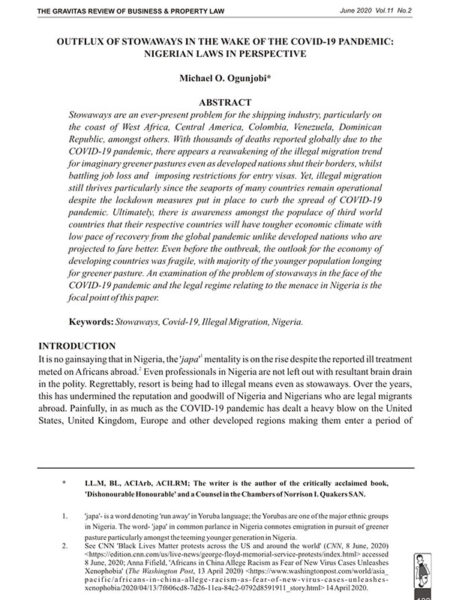
Outflux of Stowaways in the Wake of the Covid-19 Pandemic: Nigerian Laws in Perspective
0₦2,500.00Michael Ogunjobi, Counsel in the Chambers of Norrison I. Quakers SAN, in his article, Outflux of Stowaways in the Wake of the Covid-19 Pandemic: Nigerian Laws in Perspective, observes that the issue of stowaways is a major headache for the shipping industry. Against the background of the coronavirus pandemic, Ogunjobi comprehensively reviews Nigerian laws, regulations and international instruments on seaport entry and exit requirements, protection, sanctions and prosecution of stowaways.
-
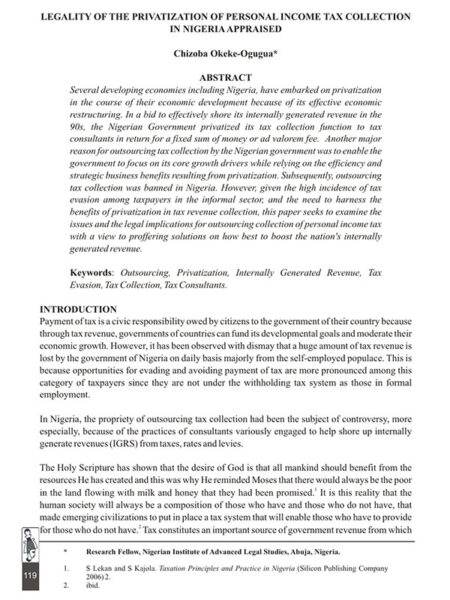
Legality of the Privatization of Personal Income Tax Collection in Nigeria Appraised
0₦2,500.00Chizoba Okeke-Ogugua, Research Fellow at the Nigerian Institute of Advanced Legal Studies Abuja Nigeria in her article, Legality of the Privatization of Personal Income Tax Collection in Nigeria Appraised, argues that though outsourcing of tax collection, which was rampant in the 1990s due to governments bid to shore up internally generated revenue, had been banned, given the high incidence of tax evasion among taxpayers in the informal sector, there are immense benefits in outsourcing tax collection in order to boost government revenue generation aggressively; with a caveat that measures must be implemented to monitor and supervise the activities of tax consultants or collectors.
-
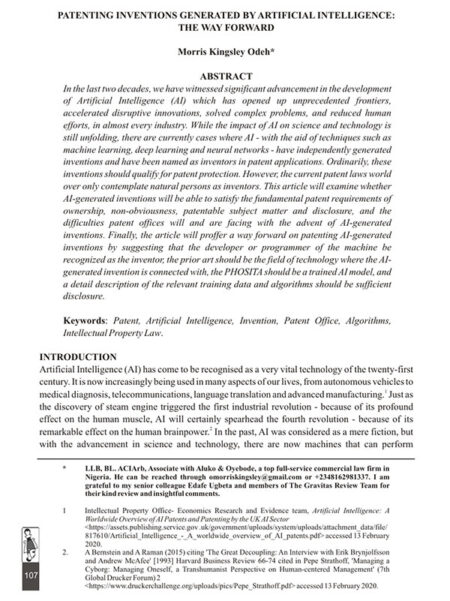
Patenting Inventions Generated by Artificial Intelligence: The Way Forward
0₦2,500.00Morris Odeh, Associate with Aluko & Oyebode in his article, Patenting Inventions Generated by Artificial Intelligence: The Way Forward, observes that the world has witnessed significant advancement in the development of Artificial Intelligence (AI) which has opened up unprecedented frontiers, accelerated disruptive innovations, solved complex problems, and reduced human efforts, in almost every industry. While the impact of AI on science and technology is still unfolding, there are currently cases where AI – with the aid of techniques such as machine learning, deep learning and neural networks-have independently generated inventions and have been named as inventors in patent applications. Ordinarily, these inventions should qualify for patent protection. However, the current patent laws only contemplate natural persons as inventors. Odeh examines whether AI-generated inventions will be able to satisfy the fundamental patent requirements of ownership, non-obviousness, patentable subject matter and disclosure, and the difficulties patent offices will and are facing with the advent of AI-generated inventions.
-
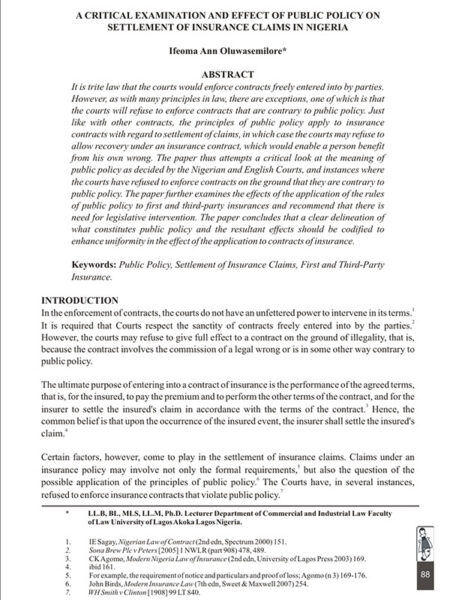
A Critical Examination and Effect of Public Policy on Settlement of Insurance Claims in Nigeria
0₦2,500.00Dr Ifeoma Oluwasemilore of the Department of Commercial and Industrial Law Faculty of Law University of Lagos, Akoka Lagos, Nigeriain her article, A Critical Examination and Effect of Public Policy on Settlement of Insurance Claims in Nigeria, attempts a critical look at the meaning of public policy as decided by the Nigerian and English Courts, and instances where the courts have refused to enforce contracts on the ground that they are contrary to public policy. Oluwasemilore further examines the effects of the application of the rules of public policy to first and third-party insurances and advocates a clear delineation and codification of what constitutes public policy to enhance uniformity in the effect of its application to contracts of insurance.
-
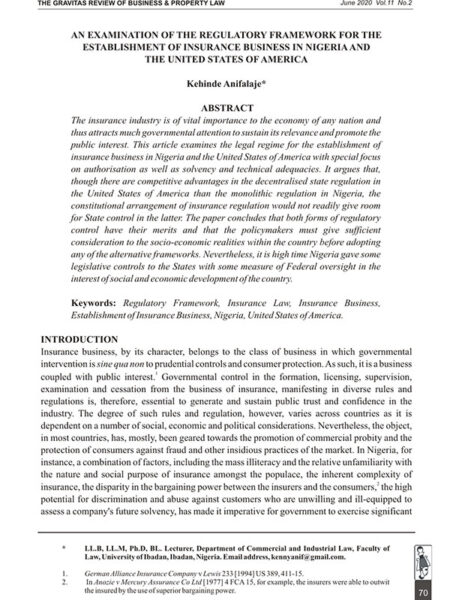
An Examination of the Regulatory Framework for the Establishment of Insurance Business in Nigeria and the United States of America
0₦2,500.00Dr Kehinde Anifalaje of the Department of Commercial and Industrial Law Faculty of Law, University of Ibadan Nigeria in his article, An Examination of the Regulatory Framework for the Establishment of Insurance Business in Nigeria and the United States of America, examines the legal regime for the establishment of insurance business in Nigeria and the United States of America with special focus on authorisation as well as solvency and technical adequacies. Dr Anifalaje argues that though there are competitive advantages in the decentralised state regulation in the United States of America than the monolithic regulation in Nigeria, the constitutional arrangement of insurance regulation would not readily give room for State control in the latter. He concludes that both forms of regulatory control have their merits and that the policymakers must give sufficient consideration to the socio-economic realities within the country before adopting any of the alternative frameworks.
-
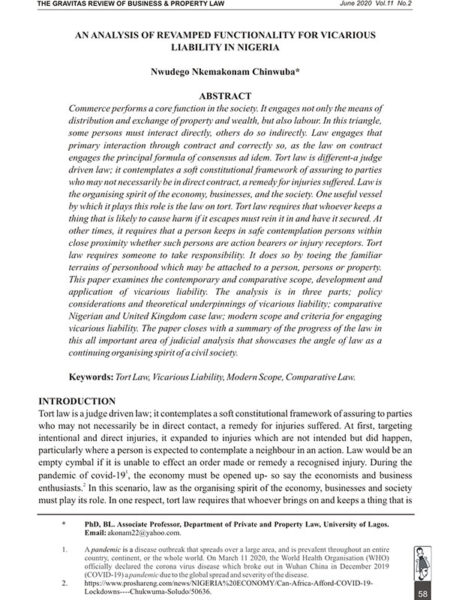
An Analysis of Revamped Functionality for Vicarious Liability in Nigeria
0₦2,500.00Dr Chinwuba Nwudego, Associate Professor of Law University of Lagos Akoka Nigeria in her article, An Analysis of Revamped Functionality for Vicarious Liability in Nigeria, observes that Tort Law, a judge driven law, contemplates a soft constitutional framework of assuring to parties who may not necessarily be in direct contract, a remedy for injuries suffered. She examines the contemporary and comparative scope, development and application of vicarious liability in Nigeria and the United Kingdom. She further explores the policy and theoretical basis, and the modern scope and criteria for engaging vicarious liability. She summarises the progress of the law in this area and shows how it has continued to be the organising spirit of society.
The Gravitas Review of Business & Property Law



